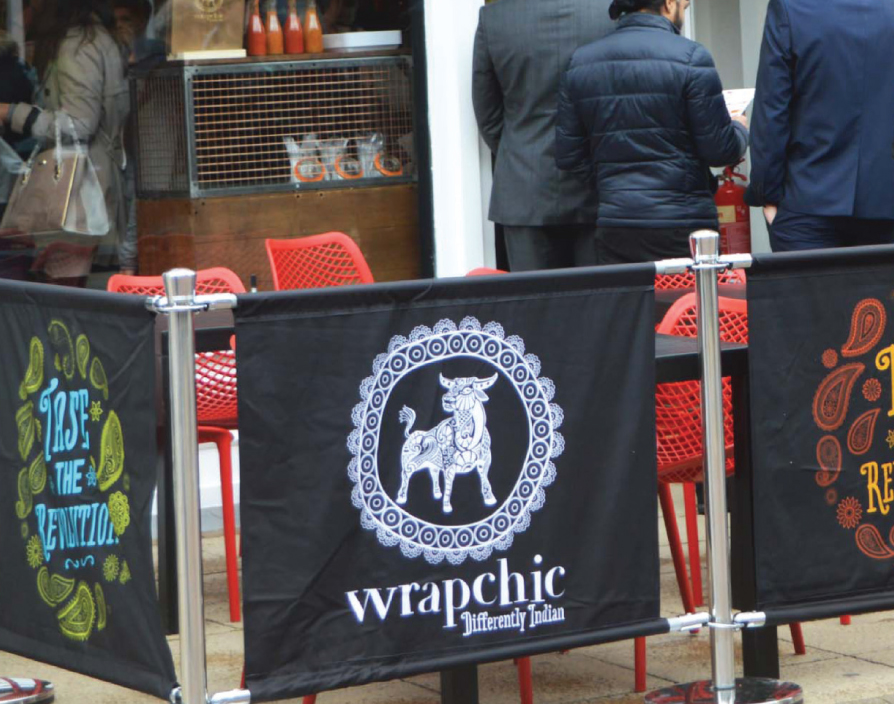The UK food landscape is rich with diversity and choice. Brits can take to shopping centres, high streets, alleys, the occasional disused Victorian toilet and markets nationwide to bombard their bellies with culinary creations, selecting from countless cuisines to get those taste buds blazing.”
A 2017 report of the UK restaurant scene from PwC, the professional services firm, found consumers are eating out now more than ever and for all sorts of reasons. That’s generated a shift in the way the market traditionally operated, producing more crossovers such as food-to-go stores open for longer hours, eat-in spots offering takeaways and not forgetting fusion foods – the very essence of a crossover. And on a mission to capitalise on these trends is Mahesh Raikar, the founder and managing director of Wrapchic, the Indian burrito franchise.
India-born Raikar knew what he had to develop for the UK market from both experience and passion. He ran his own catering business before moving to Britain and once arriving here he joined Compass Group, the contract catering company, in a post he held for nine years. “I got the chance to travel and see the best of food, chefs and catering minds,” says Raikar of his time globetrotting with the firm. “With Indian food in the UK, you only see the sit-down experiences for £20 a head. And in terms of flexibility, you see supermarkets dedicating a decent shelf space to Indian food, so the UK audience is now cooking at home.””
Determined to bring something totally original onto the scene acting as an alternative to the dine-in and DIY options of old, an idea struck Raikar like a bolt of lightning. “I saw a big gap in the market for Indian food in quick-service restaurants (QSR),” he says. “And then I bumped into a Mexican burrito chain and that was the light-bulb moment – to bring Indian food in that format for QSR.” Given that uniqueness, you may think Wrapchic doesn’t have any rivals on the market but that’s not the case – Raikar has his eye on some very big businesses. “The competition is everyone looking for the £5 to £6 spend,” he says. “So if we’re on a high street where there’s a McDonald’s, Greggs or a Subway, they’re all fighting for the same pie.”
Wrapchic had humble beginnings as a food stall in Birmingham. During that stage, after leaving Compass Group in January 2011 with the Wrapchic mission underway, Raikar left no stone unturned to perfect the final formula for his business as he assessed the food and vibe at each Mexican burrito restaurant and Indian street food stand he could find as a way to measure his own offering. However, friends and family weren’t convinced. “When I was conceptualising this and telling everyone I wanted to make a QSR with a burrito and Indian fillings, the burrito was in its infancy,” he recalls, noting that KFC’s introduction of burritos helped to build exposure. “There was a lot of hesitance in terms of people not knowing how it would be executed. They all kept saying there’s no such thing as Indian burritos. At the time, I was in a well-paid job with a good company and had given all that up for something people had never seen, so that was a difficult phase but I really believed in what I was doing.”
His determination paid off as Raikar eventually opened the first Wrapchic store in July 2012, 18 months after leaving corporate life behind him. “Most time was spent in the store explaining what a burrito is and then the complexity of an Indian burrito, which was a bit of a challenge, but the product did the talking for us and is one of the reasons we’ve been able to sustain,” he says. “Good branding can only take you so far. If the product didn’t do the talking, I wouldn’t have been able to grow to the level I have with the brand.””
Seemingly communicating the concept wasn’t too much of a challenge though, as a second store was opened in September that same year, which marked Wrapchic’s foray into franchising. “The traditional franchise model says you need to be a business running for at least two years before you roll-out and become a franchisor,” Raikar continues. “An opportunity opened the door and I jumped on it and I think that’s given us the edge.Franchisees want to be part of this – it’s an amazing place to be at in this climate.”
Demonstrating how it pays not to burn bridges, Compass Group was responsible for opening said door with a corporate franchise in Leicester at the De Montfort University. “The food was unique and different and they had big gap in the market to serve the ethnic mix they had in their portfolio – we were the right fit at the time,” he explains.”
Further franchisees came aboard the business by approaching Wrapchic and proactively demonstrating interest. The second franchisee to follow on from Compass Group was an individual that launched a store in late 2013 at the Bullring shopping centre in Birmingham, who won Raikar over with his enthusiasm. “Without a shadow of a doubt, you need to believe in the concept and the passion needs to be there,” he says. “Funds can be arranged and location can be arranged, but if you’re not passionate it’s not going to drive your business forward.”
Although Wrapchic’s franchise arm started off without all the systems in place, Wrapchic formally entered the franchise market and started actively pushing its network in 2017 after it joined the bfa. Discussing some of the franchising difficulties met along the way, Raikar highlighted the fact he’s entrusting someone to look after his brand. “We had people who didn’t understand franchising that wanted to create their own version of Wrapchic,” he said. Helpfully the good outweighed the bad as many franchisees have opened second stores. “It’s been an eye-opener, which made us look at systems and make amendments with the processes in place to support the franchisee to run their own business. We have a turnkey solution for franchisees who come on board. There’s a backend process, even before they come on board, they have to visit three stores, speak to the franchisees and understand what’s involved.”
Now at 17 stores, six of which are company-owned and franchises making up the rest, Raikar believes franchising will be the primary direction for the business in the future. And while there are a couple of sites in Dubai, the UK is the main focus for Wrapchic, with plans to hit 25 restaurants by the end of 2018, leading on to 30 sites opened annually from next year onwards. “Indian food is loved and admired but not represented in QSR and that’s what we’re trying to fill,” he concludes. “We’re not expecting you to eat at Wrapchic seven days a week but in food court environments you have burger chains, Chinese or pan-Asian, we’re your choice for Indian.””![]()

































